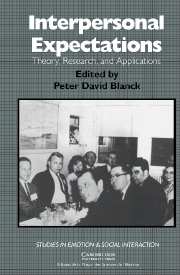Book contents
- Frontmatter
- Contents
- Preface
- List of contributors
- Introduction
- 1 Interpersonal expectations: Some antecedents and some consequences
- 2 Systematic errors to be expected of the social scientist on the basis of a general psychology of cognitive bias
- Part I Research on interpersonal expectations
- Part II Research on the mediation of interpersonal expectations through nonverbal behavior
- Part III The study of interpersonal expectations
- Author index
- Subject index
- Studies in Emotion and Social Interaction
1 - Interpersonal expectations: Some antecedents and some consequences
from Introduction
Published online by Cambridge University Press: 23 December 2009
- Frontmatter
- Contents
- Preface
- List of contributors
- Introduction
- 1 Interpersonal expectations: Some antecedents and some consequences
- 2 Systematic errors to be expected of the social scientist on the basis of a general psychology of cognitive bias
- Part I Research on interpersonal expectations
- Part II Research on the mediation of interpersonal expectations through nonverbal behavior
- Part III The study of interpersonal expectations
- Author index
- Subject index
- Studies in Emotion and Social Interaction
Summary
It is a classic conception of progress that it is spiral in form. This volume, artfully conceived and orchestrated by Peter Blanck, lends support to that geometric conception. The spiral underlying this volume begins with the classic context-setting paper by Donald Campbell. That paper was presented at the first symposium on the social psychology of the psychological experiment, a 1959 symposium that dealt, in part, with the unintended effects of experimenters' expectations on the results of their experiments. It is now 1993, and this volume gives the current position of the moving spiral.
It is a heartening and enlightening experience to see more than 30 years of science go flashing by, beginning with Don Campbell's Januslike classic that looks back to Francis Bacon's idols while it looks forward to the next generation of researchers. Campbell's classic, miraculously unpublished until this volume, seemed almost to have saved itself for this occasion. And some of the scholar-scientists of that next generation are also represented in this volume. All are young by my criteria, although ranging in career age from senior scholars of international renown to younger scholars in their first academic positions. But even the youngest scholars are already beginning to acquire that international renown.
One purpose of this introductory chapter is to review the history of some experiments designed to test the hypothesis of interpersonal expectancy effects. The earliest such experiments were designed to test this hypothesis in the context of the psychological experiment itself, with the experimenter serving as expecter and the research subject serving as expectee. What follows describes how this came about and then discusses some substantive and methodological consequences.
- Type
- Chapter
- Information
- Interpersonal ExpectationsTheory, Research and Applications, pp. 3 - 24Publisher: Cambridge University PressPrint publication year: 1993
- 7
- Cited by



